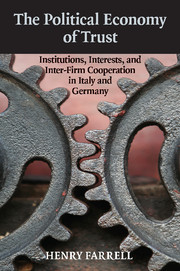 The Political Economy of Trust
The Political Economy of Trust Book contents
- Frontmatter
- Contents
- Acknowledgments
- 1 Introduction
- 2 A Theory of Institutions and Trust
- 3 Varieties of Capitalism and Industrial Districts
- 4 Trust and Institutions in Industrial Districts
- 5 Accounting for Change in Informal Institutions
- 6 Informal Institutions without Trust: Relations among Mafiosi in Sicily
- 7 Conclusions
- Bibliography
- Index
- Titles in the series
4 - Trust and Institutions in Industrial Districts
Published online by Cambridge University Press: 24 September 2009
- Frontmatter
- Contents
- Acknowledgments
- 1 Introduction
- 2 A Theory of Institutions and Trust
- 3 Varieties of Capitalism and Industrial Districts
- 4 Trust and Institutions in Industrial Districts
- 5 Accounting for Change in Informal Institutions
- 6 Informal Institutions without Trust: Relations among Mafiosi in Sicily
- 7 Conclusions
- Bibliography
- Index
- Titles in the series
Summary
INTRODUCTION
Rational choice accounts of the sources of trust provide a strong basis for understanding the sources of cooperation in industrial districts. Here I inquire whether a rational choice account can explain not only broad patterns of cooperation across the two cases but also differences between them. The existing literature on industrial districts is dominated by detailed case studies of single industrial districts, with remarkably little comparative work. Although we know that industrial districts vary widely in their patterns of economic organization, we know very little about the sources of this variation.
Moreover, the kinds of variation that we see present a quite perplexing puzzle for the political culture perspective, which has been the dominant approach to the explanation of cross-national variation in trust and cooperation. Robert Putnam's (1993) arguments about social capital posit that “civic” factors have been key to the relative economic and cultural success of Northern Italy – and the stagnation of the South. Putnam specifically refers to industrial districts as key microlevel illustrations of the links between civics and economics that he claims to have identified. In his argument:
What is crucial about these small-firm industrial districts, conclude most observers, is mutual trust, social cooperation, and a well-developed sense of civic community – in short, the hallmarks of the civic community. It is no surprise to learn that these highly productive, small-scale industrial districts are concentrated in those very regions of north-central Italy that we have highlighted as centers of civic traditions, of the contemporary civic community, and of high-performance regional government.
- Type
- Chapter
- Information
- The Political Economy of TrustInstitutions, Interests, and Inter-Firm Cooperation in Italy and Germany, pp. 95 - 131Publisher: Cambridge University PressPrint publication year: 2009
